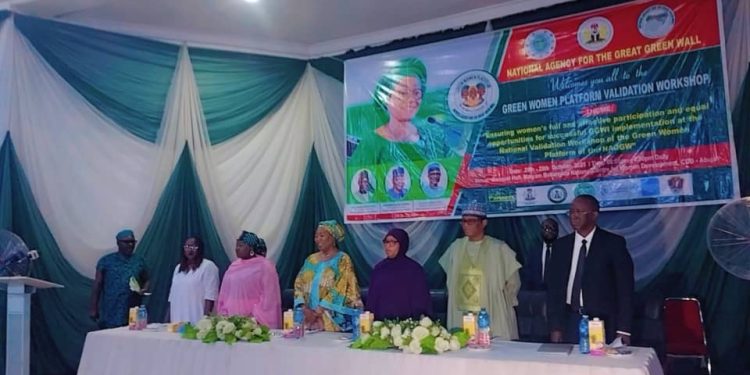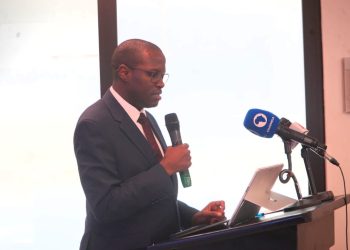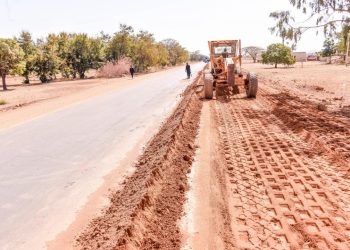…agency champions inclusion, resilience, and empowerment under the Great Green Wall Initiative
The National Agency for the Great Green Wall (NAGGW) has reaffirmed Nigeria’s leadership role in promoting women’s inclusion and empowerment within Africa’s climate resilience agenda, as it hosted the Green Women Platform Validation Workshop from October 28–29, 2025, at the Banquet Hall of the Maryam Babangida National Centre for Women Development, Abuja.
The two-day workshop, organized in collaboration with the Federal Ministry of Environment, the World Food Programme (WFP), and the Pan-African Agency of the Great Green Wall (PAGGW), brought together key stakeholders from government, civil society, academia, women’s associations, and international partners. The session provided a platform to validate the national framework, governance structure, and a two-year action plan for operationalizing the Green Women Platform in Nigeria.

In his welcome address, Director General of NAGGW, Dr. Saleh Abubakar, described the event as a milestone in Nigeria’s ongoing commitment to environmental restoration and gender inclusion. He explained that the Green Women Platform was conceived to ensure that women as custodians of the land and agents of transformation are placed at the center of the fight against desertification, land degradation, and climate change.
“The Green Women Platform is a unique innovation designed to position women as key players in restoring degraded lands, building resilient communities, and promoting sustainable livelihoods,” Dr. Abubakar said. “Here in Nigeria, women are not just beneficiaries of environmental programs; they are drivers of change within their communities.”
He expressed gratitude to the Pan-African Agency of the Great Green Wall, the World Food Programme, and the Federal Ministry of Environment for their unwavering technical and financial support, while commending the participation of women leaders, youth representatives, and the private sector for their role in ensuring the success of the platform.

Representing the Honourable Minister of Environment, Mrs. Nkechi Aneke delivered the keynote address, noting that the Green Women Platform represents “a movement for empowerment, advocacy, and transformation.” She recalled that the initiative was launched by Nigeria’s First Lady, Senator Oluremi Tinubu, during the 9th Ordinary Session of the PAGGW Council of Ministers, and is now being implemented to give practical effect to that vision.
“The fight against land degradation and climate change cannot be won without the leadership, creativity, and resilience of women,” she said. “Through the Green Women Platform, Nigerian women will not only gain a stronger voice in decision-making but also access new economic opportunities in renewable energy, reforestation, sustainable agriculture, and green enterprises.”
Mrs. Aneke emphasized that the initiative aligns with the United Nations Sustainable Development Goals (SDGs) particularly those on gender equality, climate action, life on land, and ending poverty, while reinforcing Nigeria’s readiness for COP30 in Brazil, where inclusive and community-driven climate solutions will be key.
Also represented by Mrs. Aneke, the Permanent Secretary of the Federal Ministry of Environment urged participants to see the workshop as a strategic step toward gender mainstreaming in national climate policy.
“Women bear the greatest burden of environmental degradation, yet they remain the most potent agents of resilience and adaptation,” she said. “This platform ensures that women are empowered as beneficiaries and full partners in decision-making, resource mobilization, and implementation.”
Delivering a goodwill message on behalf of Mr. Almoustapha Garba, Executive Secretary of the Pan-African Agency of the Great Green Wall, Dr. Sakaudia Tiam commended Nigeria’s strong commitment to the implementation of the Great Green Wall Initiative and highlighted the regional significance of the Green Women Platform.
“The Platform must serve as an interface and representative body for women who lack access to decision-making spheres,” he said. “It should also act as an observatory of women’s rights, ensuring their full and effective participation in local governance and equitable access to natural resources.”
He recalled that the Green Women Platform was first conceptualized by the PAGGW in 2018 and has since gained traction across several member countries, including Burkina Faso, Niger, Chad, Mali, Mauritania, and Nigeria, with invaluable support from the World Food Programme and the United Nations Environment Programme (UNEP).
In her goodwill message, the Director General of the National Centre for Women Development, Dr. Asabe Vilita Bashir, described the Green Women Platform as “a living symbol of unity, resilience, and hope,” adding that it demonstrates how women can shape environmental and social transformation through inclusive action.
“The Great Green Wall is not just a map of trees,” she noted. “It is a symbol of survival, partnership, and the power of women to redefine our collective future.”
Similarly, former NAGGW Director General, Dr. Bukar Hassan, lauded the initiative as a timely response to the realities of desertification and rural poverty, urging sustained commitment to ensure that grassroots women benefit directly from its implementation.
Throughout the deliberations, participants reaffirmed their shared determination to make the Green Women Platform a national model for women-led environmental action. They emphasized the importance of multi-sectoral collaboration among government, civil society, the private sector, and development partners to ensure the platform’s success and sustainability.
As the validation workshop concluded, Dr. Saleh Abubakar reiterated NAGGW’s commitment to ensuring that the Green Women Platform becomes a defining legacy of Nigeria’s leadership within the Great Green Wall framework.
“This workshop is more than a validation exercise, it is the beginning of a transformative journey,” he said. “Together, we will empower Nigerian women to take ownership of climate solutions, restore degraded lands, and build a greener, more resilient future for our nation and the African continent.”
Highlights of the event included the official unveiling of the Green Women Project and group photographs with participants and stakeholders.
















